How to upload documents
One of the benefits of operating in today’s workplace is that you no longer need to rely on hardcopies of documents. Not so long ago, if a document, such as a contract, required review and a signature, you'd need to send a physical version of it to the recipient. Best case scenario, you could walk it across the office or have it delivered across town in a few hours. But if the recipient was in another city, state, or country, it could take days or weeks for them to get a copy.
Now, when you need to send someone a document, you can simply upload it to a cloud platform. The recipient can instantly review the document, make changes, and even sign it. You can view their changes and see their signature without printing the document or handing the recipient a physical copy.
When you work with a lot of content, from documents to video files and PDFs to JPEGs, uploading documents to the cloud is imperative. In this article, learn more about how to upload a file, the types of files you can upload, and why it matters.
What does it mean to upload a document?
You've probably downloaded a fair share of documents and other content during your lifetime. If you've ever purchased an MP3 or music from a digital store, such as Google Play or iTunes, you've downloaded files. If you've ever saved a PDF from a website, you've downloaded files.
When you download something, your computer receives data from another computer. You then store the downloaded file on your computer or a removable device, such as a USB drive.
Uploading is the reverse of downloading: you send a file from your computer to another destination in the cloud. If you post photos or videos to Instagram or Facebook, you upload the files to those websites. An easy way to think of the uploading process is that the file needs to start on your computer and end up somewhere else, whether it's another device, a website, or an email.
However, uploading doesn’t always remove the document from your device. When you upload a PDF or other file format to a cloud-based platform, the original document often remains on your device. A separate file gets created — an exact copy of the first. That new file then lives wherever you uploaded it. Likewise, when someone downloads a file that you’ve uploaded to their device, they don't technically remove the uploaded file from its location. Instead, another version of it gets created and stored on their computer. For this reason, to prevent version-control issues, the best workflows stay in the cloud so that everyone is working on the same version.
You can upload a document in several ways, depending on how many documents you have, their size, and the platform you use. Uploading options include:
- A file browser
- File transfer protocol (FTP)
- A drag-and-drop feature
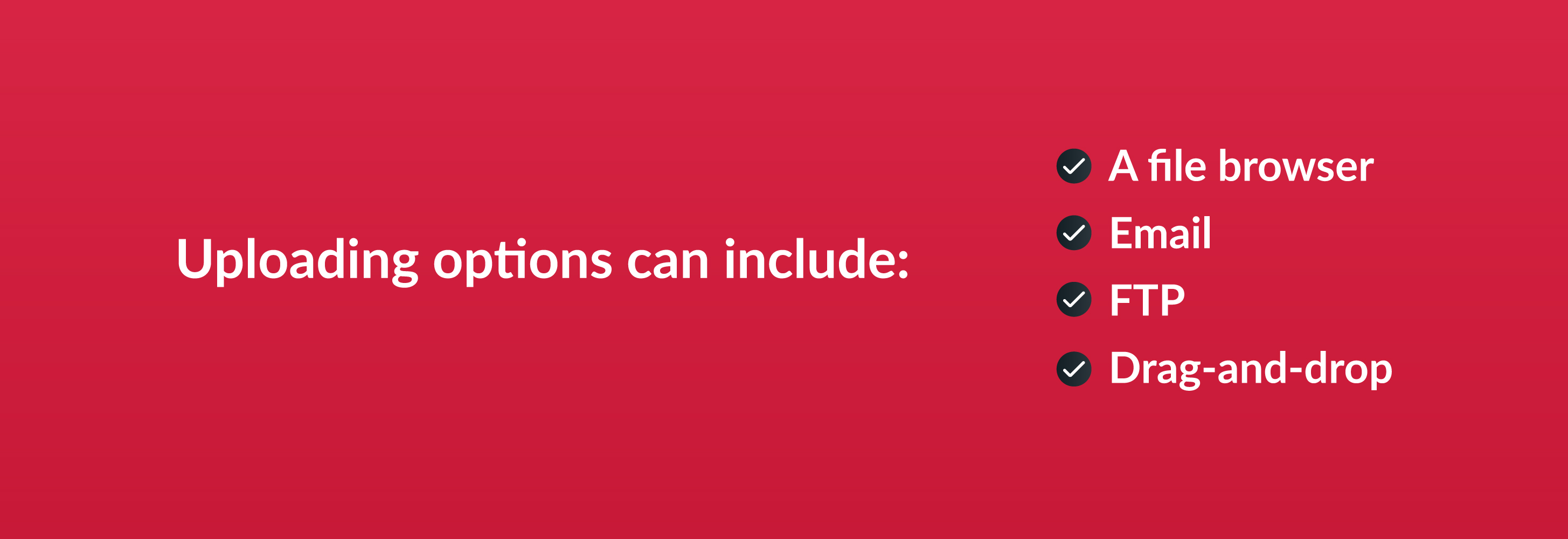
How to upload a hard copy of a document
Uploading a document that already exists in digital form is relatively straightforward. Often, all you need to do is choose the "upload" option on the destination website or program you're using, then select the file from the browser that pops up.
But say you have some older paper contracts you'd like to add to the cloud, or a typed manuscript you want to digitize for safekeeping. Before uploading this kind of file from one computer to another, you need to transform the hard copy into a digital format.
There are several reasons for digitizing paper copies of documents:
- Creating a digital version of an older document and storing it on the cloud gives you a backup if something should happen to the original
- It's easier to share digital versions of older documents
- If the physical original is particularly old, you might be worried that it will crumble or fall apart as more people handle it
- A physical copy is more easily misplaced
With a digital version of the document you can preserve the original while still accessing the information in the document digitally. Once you digitize and upload it, you can share your document anywhere in the world. Your coworkers might need access to old company photos or older marketing materials, for example. Or maybe your legal team at headquarters needs to review old contracts from employees at your location. When you digitize those documents and upload them to the cloud, you and your team can access them from any device at any time.
There are a few different options for scanning a document and uploading it to your computer or another destination. We’ll start with how to upload a version of a physical document.
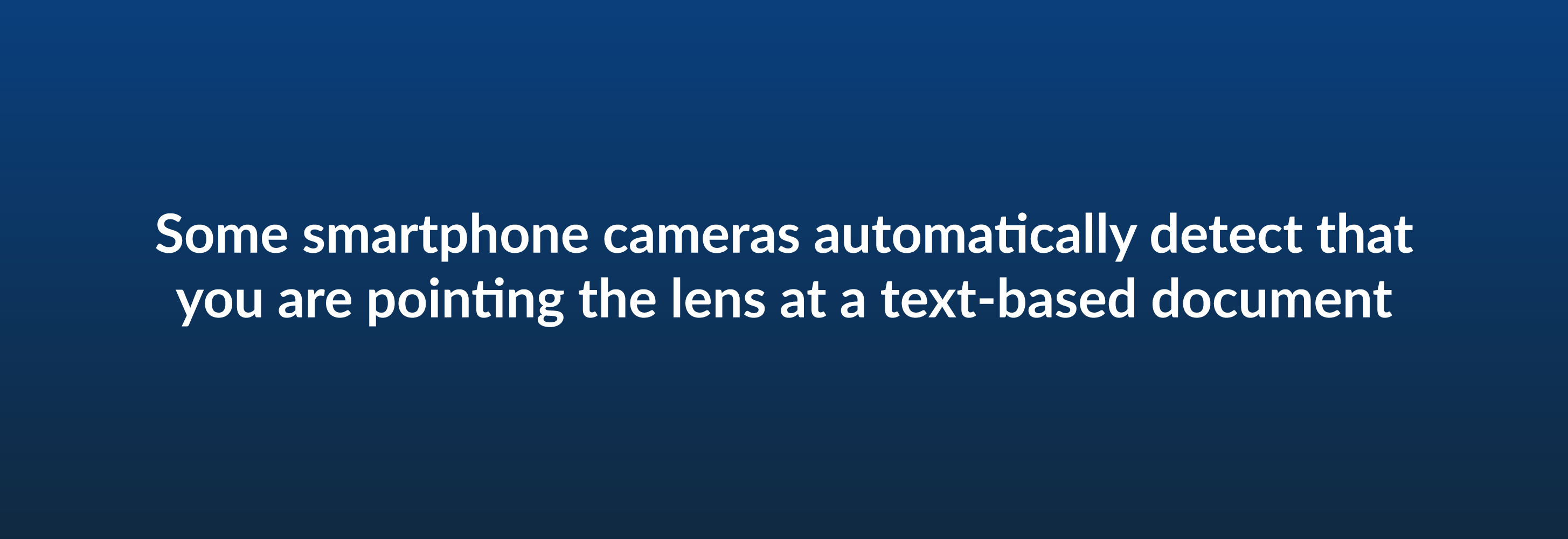
Using the camera on your smartphone or tablet
Depending on the type of smartphone or tablet, you may have several options for scanning a document to digitize it, using your phone's camera to capture an image of the document. Scanning your documents can be as easy as taking photos on vacation.
For instance, you might be able to open the camera and point it at the first page of the document you want to scan. Some smartphone cameras will automatically detect that you are pointing the lens at a text-based document and convert to scanner mode. When you take the picture, the camera will scan the document so that the text is clear and legible. You then edit the scanned document using the app's built-in tools.
If your phone's camera doesn't automatically detect text and scan documents, or if you have several pages to scan, a better option might be to use an app, such as Google Drive or OneDrive. The Notes app on iOS also has a scanning feature.
One benefit of scanning images is that you can then edit them with ease without the risk of ruining the original. If the original image is considerably damaged, you can improve the scan or photo using an image-editing program, rather than spending the time and money needed to restore the original image. Scanning the image with a phone camera doesn't require feeding the pages into a machine, which means there’s less opportunity for physical damage.
Best of all, when you scan a document using your device, you can often upload that digitized document directly from the same device.
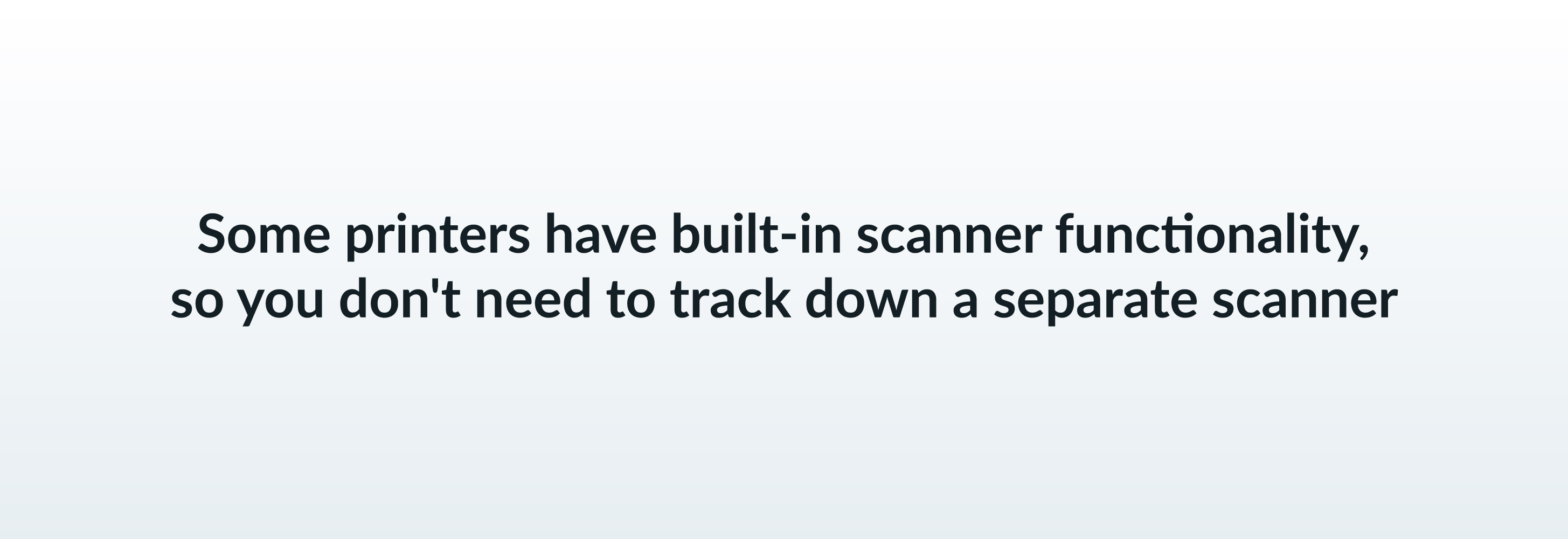
Scanning a document and uploading it to a computer
Maybe you're not comfortable using a mobile device to scan or take photos of documents. Or, you might have a large stack of documents and don't want to take a picture of each page manually. Another option is to use a scanner connected to a desktop or laptop computer or an external storage device. Using a scanner might also be your best option if you need to scan documents for work and don't have a mobile device sanctioned by your employer. Your company might not want you using a personal device to scan potentially confidential business documents.
You have several options if you want to use a scanner to digitize documents. Some printers have built-in scanners, but if your printer doesn't moonlight as a scanner, you'll need another device.
Several types of scanners exist. One option is a flatbed scanner. To use a flatbed scanner, you place the document face down on a glass surface and close the scanner's lid. Tap the "scan" button, and a sensor passes back and forth beneath the glass, reading the text on the document. If the scanner connects to a computer, you might be able to see the image or text transfer to the monitor screen as the sensor passes over.
If you use a flatbed scanner, you need to move each page of the document by hand when scanning. Another type of scanner is a sheet-fed scanner. It's usually smaller than a flatbed scanner and features an opening on each end. You place a pile of documents to be scanned on the top of the opening. Press scan, and the sheets pass through the body of the scanner, one by one, coming out of the opening on the other end.
Once you scan a document, how the digitized version makes it to your device depends on a few factors. If the scanner is connected directly to your computer via a cable, there will most likely be a file folder on your device that contains the scanned documents. Simply click on the folder to access the documents.
Some scanners use WiFi to connect to nearby devices, while others let you plug in a USB flash drive to load the files. Once you finish scanning, you eject the drive, then plug it in to another device to upload the new files.
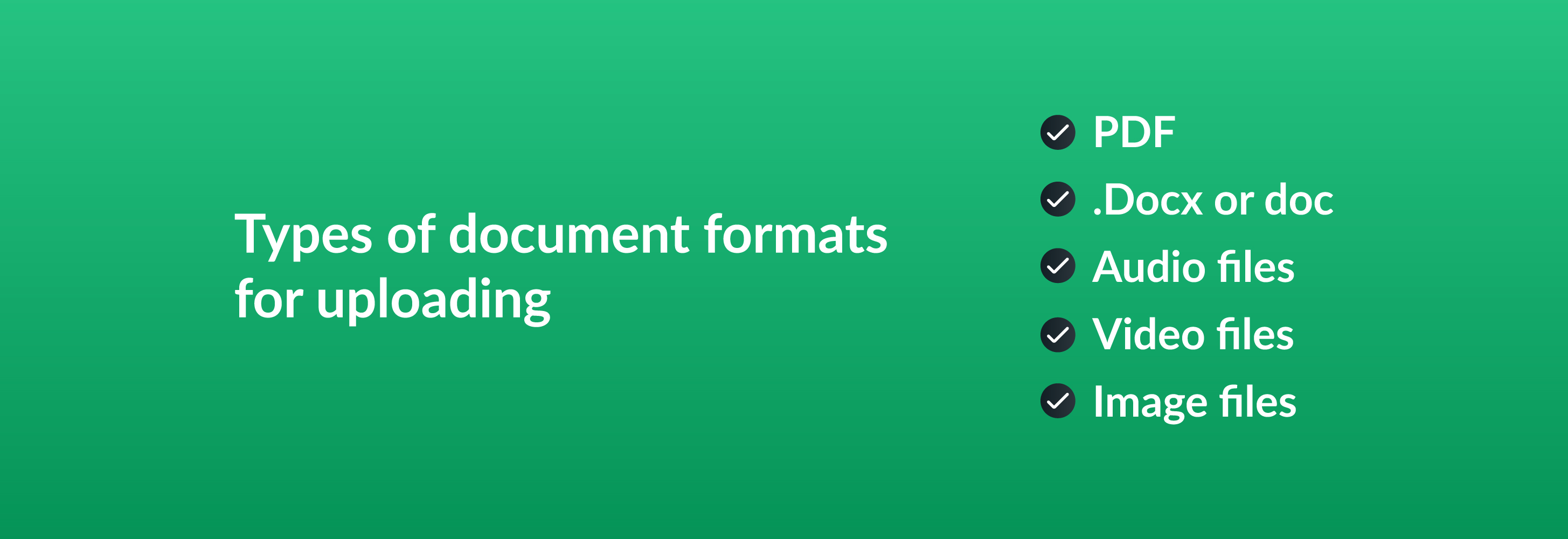
Types of document formats for uploading
Documents come in many formats and sizes. Some are text-based, while others are images. Depending on your company's content needs, you might also have to upload video and audio files. Let's take a closer look at a few of the more common types of document file formats and when you might upload them.
PDF stands for portable document format. Adobe created the PDF format to facilitate the exchange and presentation of documents. When you save a document as a PDF, the recipient usually can't edit or alter the document.
PDFs are universal documents. Whether someone opens a PDF on a PC or a Mac, on a laptop or a smartphone, the arrangement and formatting of the document will look the same. What's on page one will be on page one for every user. PDFs work well to preserve the exact design and formatting of the original document and are also easy to view and share on most devices.
A PDF file can have both text and images in it. Some PDF files are fillable, meaning that users can open them and add information. A common example of a fillable PDF is a form, such as a tax form. You can easily upload a PDF to almost any destination website or program by clicking "upload" and selecting the PDF file from your computer. These files usually have ".PDF" at the end of the file name.
Docx or doc
A .docx or .doc file is a document file created in Microsoft Word. Before 2006, only Microsoft Word could open .doc files., but today, most word processing programs can read them. However, unlike a PDF, a .docx or .doc file might look different when opened by different users. The pagination or layout of the text can vary slightly between devices and programs.
The .docx format came into existence in 2007. The "x" in the extension refers to XML or extensible markup language. These types of files are smaller and less likely to be corrupted than .doc files. Images also look better on .docx files.
.Doc and .docx files are meant to be edited and altered, making them a good option when you intend to collaborate on a document with others.
Audio files
You can divide audio files into two broad categories — compressed and uncompressed. Compressed files can be either lossy and lossless. These descriptors have to do with file size and quality. Lossy audio files include MP3s, which lose some data when they are created, affecting their sound quality. However, the quality loss often isn't significant enough for the average listener to detect.
Lossless audio files include FLAC and ALAC. These two formats compress a file without removing data from it. There's no loss of quality, so the file sizes are usually much larger than lossy files.
Uncompressed audio files tend to be quite large and also the highest quality. Examples include Pulse-Code Modulation (PCM) and Direct Stream Digital (DSD). You can upload most audio files to a cloud storage solution depending on the file size limit for the platform you use. Certain websites and other programs may not recognize or allow you to upload all audio files . Email, for example, often has a file size limit that prevents you from uploading an uncompressed or lossless audio file.
Video files
Video files rely on codecs for compression. These are devices or computer programs which encode or decode a data stream or signal. Without a codec, the files themselves would be massive. As with the audio files, the higher the video file quality, the larger the file. AVI files usually have the best quality and are also quite large. MP4 files are popular and relatively small and have a lower definition than other options.
Image files
Like audio files, image files can be compressed or uncompressed. Images files can also be vector or raster files. Raster images consist of pixels, which are like little blocks. If a raster image is resized, the pixels can become distorted, making the picture look blurry. Examples of raster image files include JPEG, PNG, and GIF.
A vector image file is created using a proportional formula. The image can easily be resized without it becoming blurry or distorted. Examples of vector file types include PDF, AI, and EPF. Not all PDFs are vector images — some can be raster images depending on how the document was originally created.
A RAW image file is an example of an uncompressed file. It's neither a raster nor a vector file and is perhaps the purest form of the image. Usually, a camera captures a RAW image, and the file format converts to a raster or vector file when you upload it to an editing program.
Uploading documents from a mobile device
Sometimes you want to upload documents from your phone or tablet to your file-sharing platform or a server. You can do so quickly if your platform has a mobile app or a mobile version of its website. If that's not an option, you may be able to upload the document by emailing it.
You need to have the document on the device in order to upload a file. If that document is a hard copy, you can first capture it by scanning it or taking a photo. You can also connect your device to another computer using a USB cable and transfer documents from that computer to your tablet or phone before uploading them.
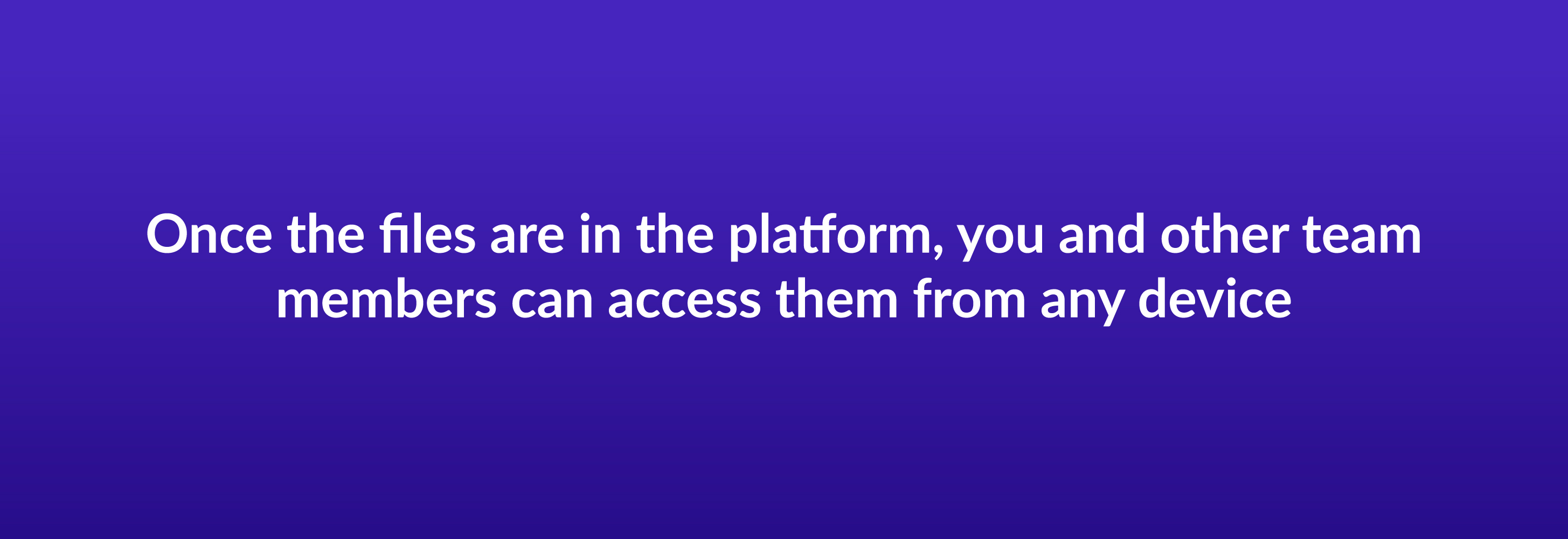
Uploading large documents
Some types of documents, such as lengthy PDFs with lots of images, uncompressed audio files, and high-definition video files, can get pretty big. When you try to upload them using FTP or email, you might exceed the capacity limit set by your internet service provider. A better option is to upload the files to a cloud-based file-sharing platform. Once the files are in the platform, you and other team members can access them from any device.

Uploading documents to Box
The Content Cloud makes it easy for everyone on your team to access the content you upload. You have several options for uploading your documents to the Content Cloud, based on the type of Box account you have. All account types can use the file browser feature. Enterprise and business accounts can also use FTP or email to upload files.
There's even a drag-and-drop feature you can use to upload files from your desktop or tablet to Box. You can drag the files to the folder you want them to upload into, and it works on Chrome, Firefox, and Safari browsers.
File-size limits for uploads vary depending on account type. If you have a personal Box account, the maximum size of any one file is 250 MB. For starter accounts, the size limit jumps to 2 GB. Enterprise Plus accounts allow the most significant file uploads, up to 150 GB.
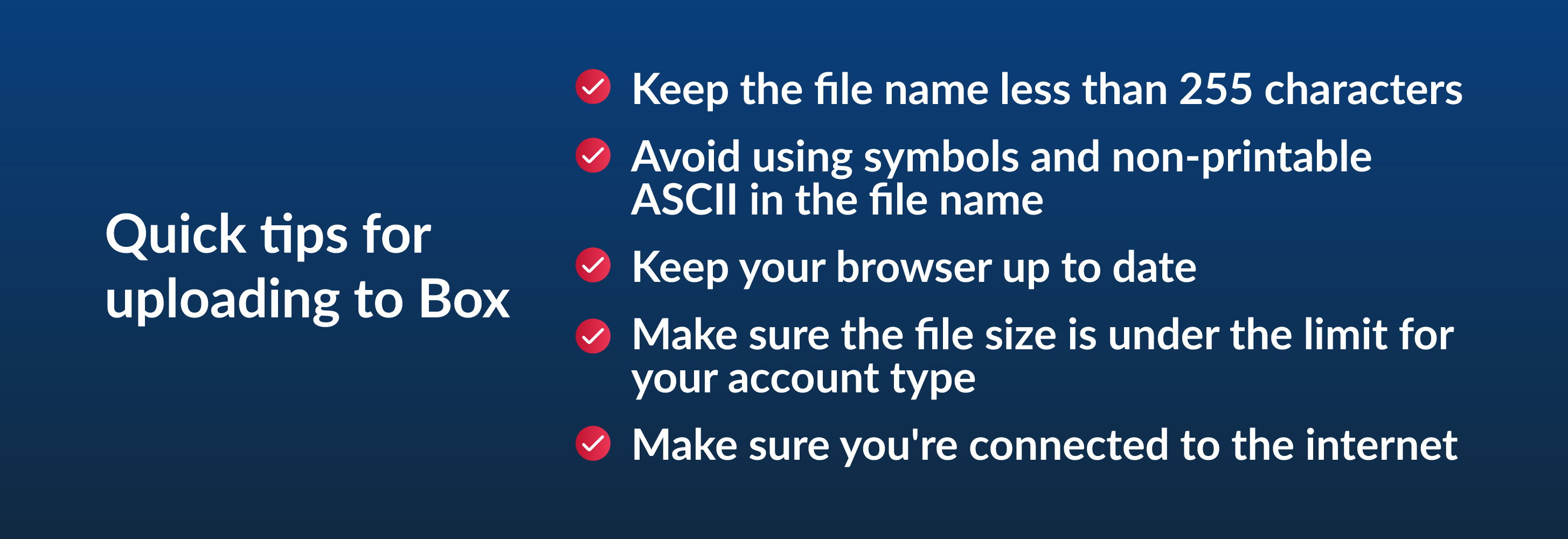
Quick tips for uploading to Box
Box is intuitive and user friendly. When you upload documents to the Content Cloud, keeping these tips in mind helps the process go smoothly:
- Keep the file name less than 255 characters
- Avoid using symbols and non-printable ASCII in the file name
- Keep your browser up to date
- Make sure the file size is under the limit for your account type
- Make sure you're connected to the internet
Work is more efficient when everyone’s collaborating in the cloud. Box gives you a secure place to upload your content, share it with colleagues, assign permissions, and delegate tasks. The Content Cloud provides a central location for accessing the videos, contracts, audio files, marketing materials, and other content types that power your business.
Contact us today to learn more about our collaboration tools and to see how the Content Cloud works for yourself.
**While we maintain our steadfast commitment to offering products and services with best-in-class privacy, security, and compliance, the information provided in this blogpost is not intended to constitute legal advice. We strongly encourage prospective and current customers to perform their own due diligence when assessing compliance with applicable laws.